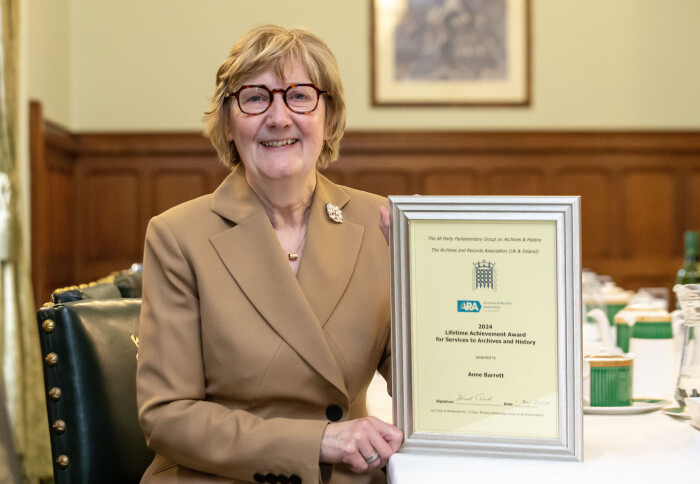Imperial’s Archivist Anne Barrett awarded lifetime achievement prize
by Maxine Myers

Imperial’s Archivist has been honoured with a parliamentary award for her career to date.
Anne Barrett, Archivist and Corporate Records Manager at Imperial, has been awarded The All Party Parliamentary Group on Archives and History Lifetime Achievement Award.
The award is in recognition of her achievements as Imperial’s archivist, a role she began in 1989, as well as her role in other archival, records management and history related committees nationally and internationally. She has mentored early career archivists at Imperial and for the Archives and Records Association (ARA), the archivists professional body.
Maxine Myers caught up with Anne to learn more about her award, her career and why archiving is so important for the future of science and teaching.
1. Can you tell me about your award?
The All Party Parliamentary Group on Archives and History (AAPGAH) presented me with a Lifetime Achievement Award for my career to date.
All Party Parliamentary Groups are cross party groups made up of members from political parties and representatives of organisations who meet to discuss issues relating to their topic.
I was nominated for the award by Chris Evans, Member of Parliament for Islwyn and Principal Chair of the AAPGAH group.
2. How do you feel about the award?
I was so surprised and it was totally unexpected. At the ceremony David Clarke, Baron Clarke of Windermere, presented my award. He told me that his daughter is also an archivist, and he really understands the role of archivists and why our work is so important.
3. What do you enjoy about your role at Imperial?
I enjoy the range of things we do as a team and the many people we meet and work with in the university and externally.
We are proactive and reactive to internal and external enquiries. We research information, text and images for enquirers and events. We had early involvement in starting the Freedom of Information and Data Protection work and we introduced a digital records management system across Imperial’s administrative services.
We undertake exhibitions and run campus tours when possible, of the Queen’s Tower too.
We look after the university’s artwork, and I am co-chair of Imperial’s Artwork Group with Professor Richard Jardine Fellow of the Royal Society (FRS), Proconsul and Professor of Geomechanics in Civil and Environmental Engineering, which aims to better reflect the diversity of our community through art.
We have been able to commission portraits of underrepresented people which has been great, and we have more projects in the pipeline.
4. Are there any key highlights that stand out for you during your time at Imperial?
I would say there’s been several. Hosting David Attenborough while he filmed for the BBC was a marvellous opportunity. Meeting and talking to many of the leading scientists, staff and students is a valued privilege, as was visiting CERN.
I am proud of the Imperial Artwork group and that I have a role in it. I think the group’s work makes a difference to how we represent people in science.
Another highlight for me is working with my team. We enjoy what we do and developing things such as new digital systems to enhance record keeping and disseminate the history of Imperial.
I am involved in the Science and Engineering Research for Cultural Heritage (SERCH) – a group made up of Imperial’s researchers and external museum conservators who evaluate current technologies and investigate new ways to conserve objects. I get to meet lots of people involved in preservation which is one of my areas of interest.
5. Why is it important to preserve records?
It is very important, because we collect now for the future. If I don’t know what is happening in Imperial’s life today, I can’t ensure we have a full record of Imperial, its work and culture to inform the university’s future life.
It will help people see what and why key decisions were made. This is not only for Imperial’s future leaders and developers but also for the history of science and teaching.
Photo by Simon O’Connor for the Archives and Records Association
Article text (excluding photos or graphics) © Imperial College London.
Photos and graphics subject to third party copyright used with permission or © Imperial College London.
Reporter
Maxine Myers
Communications Division